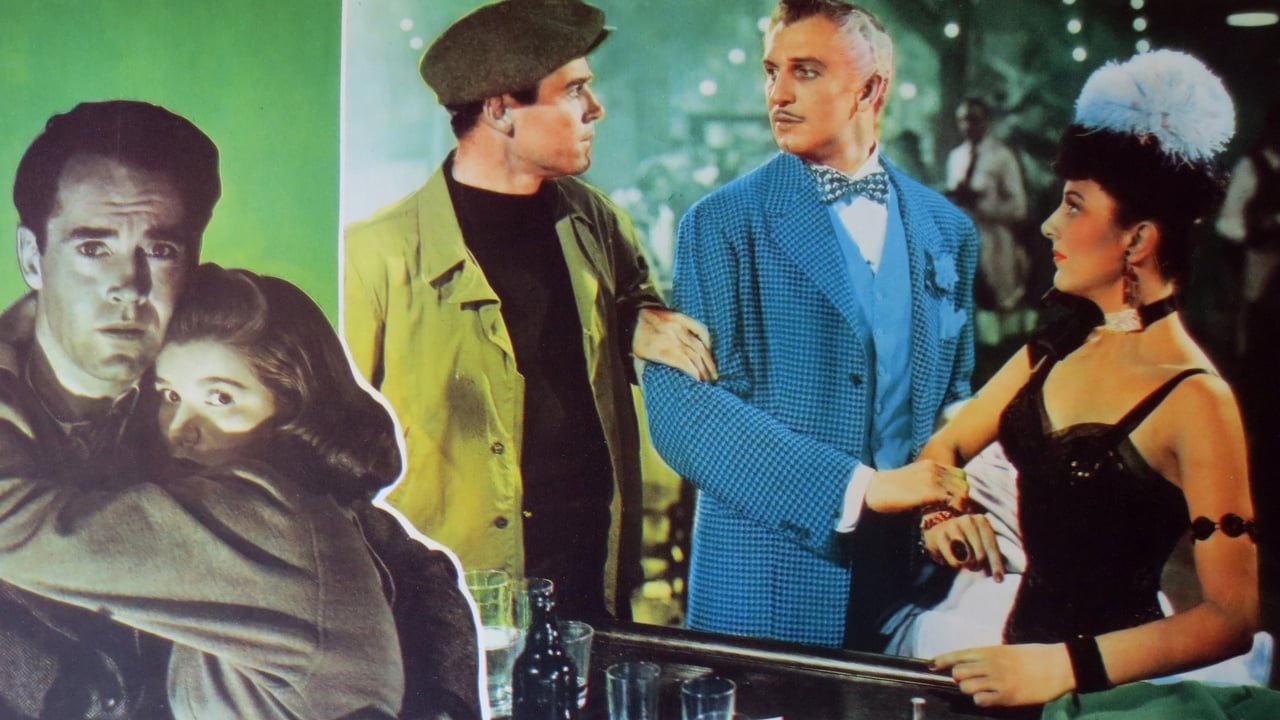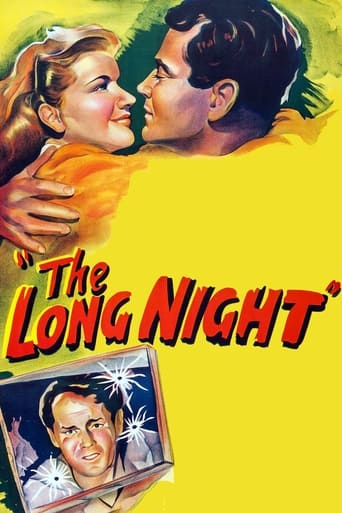

This is a brief review of "Decision Before Dawn", "Sorry, Wrong Number" and "The Long Night", three films by director Anatole Litvak.Born in the Ukraine, Litvak's career as a film-maker took him from Russia to Germany to France and eventually to Hollywood, where he became a contract director for Warner Bros. He directed "Decision Before Dawn, regarded as one of his finest pictures, in 1951. It tells the tale of Happy (Oskar Werner), a German soldier who, in 1944, defects and becomes an Ally double agent. At the command of American Colonel Devlin (Gary Merrill), Happy embarks on a mission deep behind German lines."Decision Before Dawn" was one of many Hollywood films released in the 1950s which attempted to rehabilitate Germans as "now our allies". Like the similarly themed "The Big Lift" (1950), it boasts superb location photography, Litvak filming in actual cities still scarred by war and still littered will real WW2 machinery. Whilst the film's promises of complexity are eventually betrayed, Litvak's establishing shots, handling of spaces and architecture, his grand outdoor vistas and a beautifully dour performance by Oskar Werner, elevate things tremendously. Werner would milk similar material in Martin Ritt's 1963 masterpiece, "The Spy Who Came in From the Cold". Today, "Decision Before Dawn" plays like a rebuke to Litvak's own "Confessions of a Nazi Spy" (1939), one of the first blatantly anti-Nazi films.Released in 1947, and a remake of Marcel Carne's superior "Le Jour Se Leve", Litvak's "The Long Night" stars Henry Fonda as Joe Adams, a man who blockades himself in an apartment following the murder of Maximillian the Great (Vincent Price), a nightclub magician. Via flashbacks we delve into the circumstances which led to this crime.Typical of Litvak, "The Long Night" boasts audacious camera work. Litvak's whip-pans, cranes, clever forced perspectives and snaking cameras were novel for the era, and his locations drip with atmosphere. While beautiful in a clinical way, Litvak's visuals still can't match Carne's poetic realism and the gauzy romantic humanism which made "Le Jour Se Leve" so famous. Litvak's film – noirish and brooding – also ends on a note of optimism, a reversal of the Carne's more downbeat ending. The film was a financial flop.Litvak released "Sorry, Wrong Number" (1948) a year later. A precursor to high-concept, modern thrillers, "Number" stars Barbara Stanwyck as Leona, a crippled woman who overhears a murder plot on her telephone. From her bedroom – the film's base of operations – Litvak's camera embarks on a dizzying quest to avert the crime, dipping into the past, different locations, through telephone lines and back out again."Sorry, Wrong Number" was based on a Lucille Fletcher radio play, which Litvak's aesthetic attempts to break free from. He glides from New York suites to State Island beaches to Manhattan skylines, but the film's print-oriented origins are hard to escape. Interestingly, Stanwyck's character is revealed to suffer from psychosomatic issues, and it is her very own flights-of-fancy, her constricting nature (epitomised by her crippled legs) which results in the film's central crime. Leona smothers her lover (Burt Lancaster), wants to make him as immobile as she is, a fact which pushes him into criminality. Throughout the film, Leona's stationariness is thus contrasted with the film's countless telephones and telephone wires, devices which seem to enable and amplify Leona's neuroses. Rather than connecting her to the outside world, these wires alienate Leona further, wrapping her up in paranoia and further illusions of control. Litvak followed "Number" up with "The Snake Pit", "Wrong Number's" thematic mirror image.7.5/10 – Worth one viewing. See "Young Man With a Horn" (1950) and "The Clock" (1945).
... View MoreHenry Fonda, Vincent Price and the film noir genre are reasons enough to see any film, and The Long Night did show a lot of promise. I didn't find that the The Long Night quite delivered enough, but it certainly has a lot of good things. It's very well made for starters, one of the most beautifully shot and visually atmospheric film noirs of the 1940s in my opinion. Dmitri Tiomkin's music is far from his best work with a lot of it sounding like re-arranged Beethoven(you decide whether you consider that a compliment, but it is very haunting and fits the film very well. But the high point of The Long Night was the acting. Henry Fonda gives an intelligently sensitive lead performance, and Barbara Bel Geddes- managing to look younger than she was- in her film debut is very touching as the love interest. Ann Dvorak is deliciously cynical, and Vincent Price is effortlessly ominous and smarmy as an utter sleaze-bag of a character(people will argue that he was at odds at the rest of the film but I rest the blame on the writing not Price). The Long Night does have faults though, the characters are not fleshed out enough to make me care for them(I would have cared more for Joe if the "when he's in jeopardy" scenario had been made less emotionally hollow and senseless), while the script is of rather rambling quality with Bel Geddes' final speech particularly contrived-sounding. The Long Night also lacks momentum pace-wise- well the final twenty minutes picks up a bit but comes too late- and the constant switching back from past to present and vice versa is enough to cause confusion. There are even some ideas like with Joe and Charlene's involvement with one another that are shoehorned in but not explained satisfactorily. So in conclusion, interesting for the cast and how it was made, but with stronger script and story execution it would've been less underwhelming than it turned out to be. 6/10 Bethany Cox
... View MoreI've never seen the original French film upon which this film was based, but I can tell you I kept waiting for a plot line payoff that never came. It has everything going for it - solid cast giving good believable performances, good direction, even a good speech that Fonda's character delivers from this broken out window as he is under siege by the police that gives us some insight into what it's like for an average guy who has returned home from years of killing and seeing killing in the war expected to pick up where he left off. But ultimately, I never see anything that Fonda's character, factory laborer Joe Adams, has been put through as far as shock or emotional torment or even disillusionment that would justifiably cause him to kill a man. Is Vincent Price's character Maximillian eloquently taunting and creepy? Yes, and in a way that Price excelled at over the years starting in noirs and proceeding on into his horror films. However, at no time does he do anything that would drive anybody to do more than shoo him away or stuff earplugs in their ears or possibly call the ASPCA (You'll have to watch the film to understand this last remark). I'm giving this film a five just for the fact that I believe the production code is the reason any hard edges that seem to be just under the surface never appear. I'm almost positive the script would have gone further if the censors would have allowed it to be so.The real point of interest to me was the action of the police, who behave a lot like the fascists that Joe Adams spent years fighting in WWII. Sure they have a murderer holed up in his rented room, but he's holding no hostages, they've emptied the building, and still they spray him twice with automatic gunfire unannounced - once from the outside into his window, then from the stairwell into the door. When he pushes a sturdy dresser against the door and they realize they can't force their way in THEN they try talking to Joe, starting with the line "We're not fooling"?? No kidding! After Fonda's speech to the crowd, once the crowd starts voicing their support for Joe and promising financial help with a lawyer the police form a line and practically trample the crowd forcing them out of the street. I don't know if the heavy handedness of the police was something that Litvak wanted the audience to notice, but it was something I noticed.I'd recommend this one just for the good performances and atmosphere and some imagery you don't see that much in films immediately after WWII, but don't expect something shocking or even interesting to happen just because of all of the talent assembled here.
... View MorePutting aside the fact that this film is a remake of a French classic by Marcel Carne, and trying to judge it independently, it is a superb noir production. It most notable element is a spectacular film debut by Barbara Bel Geddes as the innocent victim of a sleazy seducer (Vincent Price at his oiliest), who starts out frozen from her traumatic origins in an orphanage and ends up screaming her heart out with all the passion of first love. Geddes holds back in the first half of the story, refusing to accept or engage with Henry Fonda, who has declared his love for her so readily. Not only does she find it difficult to trust him, but she is in thrall to a dream created by the master illusionist Price. Fonda does very well in this film, being less droll than usual, and actually manages to convince us that he is emotionally engaged rather than a bemused spectator. The fantastic amount of firepower trained on him as he is holed up in his room in a boarding house, and the readiness of the police to shoot first and think later, is horrifying. I found it bizarre in the extreme that the music credit on the film stated 'Music composed and conducted by Dimitri Tiomkin', when most of it was a dumbed-down re-scoring by Tiomkin of the second movement of Beethoven's Seventh Symphony. That is really an outrageous 'steal'. Anna Dvorak is very good indeed in this film as Charlene, who has seen it all and then some, falls for Fonda but takes it on the chin when she sees he doesn't see her. But the film must have been seriously cut, because at one point, we see Fonda throwing himself onto Charlene's bed with a very familiar air, obviously being her lover, but the dialogue makes no overt reference to there even being a meaningful relationship. Clearly a gutted script! If you look too hard, you will see a lot of holes in the story and the action. But this film is pulled off satisfactorily anyway, is gripping and because of Geddes, is also moving.
... View More